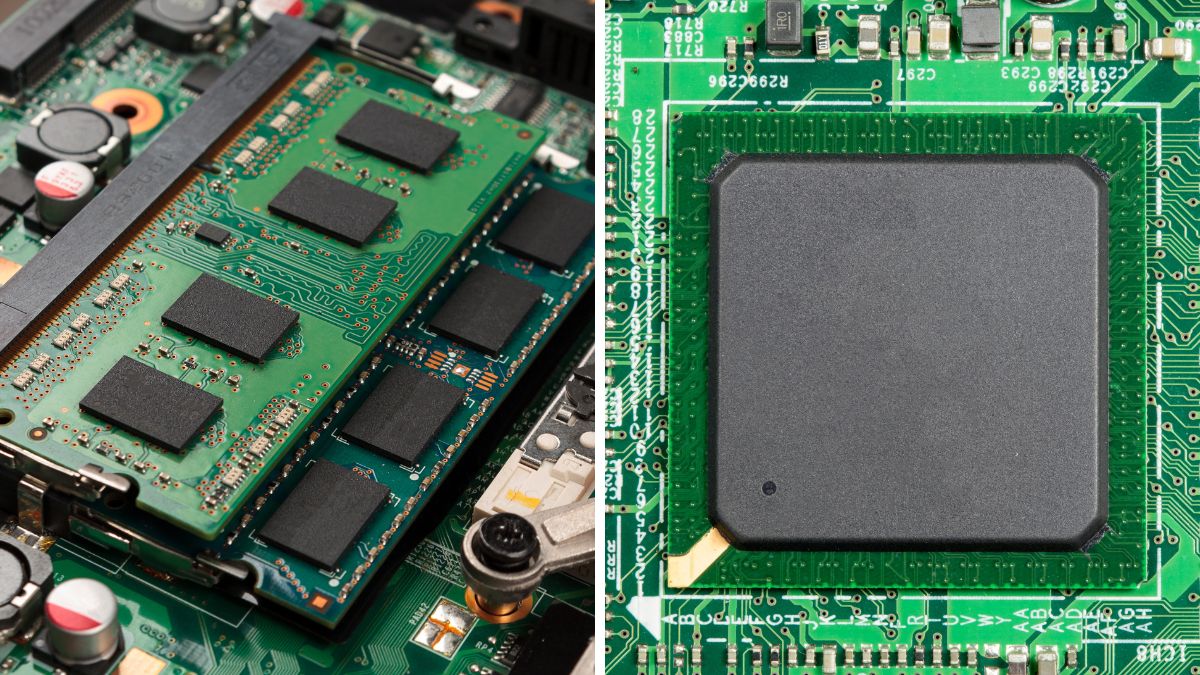Picking the right PC parts or knowing what you should pick up next is sometimes not so simple, as there are so many considerations and wrong moves to make. So when considering an upgrade, what is the relation between RAM speed and CPU speed?
You should worry about getting the best CPU speed you can fit into your budget and worry more about RAM capacity than the actual speed of the RAM. It’s better if you hit a minimum of 8GB of RAM at a lower speed and then invest in a fast CPU.
Let’s look at RAM and CPU speed and how they relate, as well as the most important considerations you should take into account when deciding what speed RAM to get, what speed CPU to get, and whether maximizing one at the expense of the other is the best idea.
What Is the Relation Between RAM Speed and CPU Speed?
While there are relationships between RAM speed and CPU speed, it is more important to ensure that the motherboard supports the RAM speeds of the modules you are looking at purchasing rather than syncing it up to your CPU speed.
However, generally the quicker your CPU, the quicker you want your RAM as otherwise, you will run into bottlenecks holding the other back. This is generally not going to be a problem that many people run into, particularly if your RAM and CPU are of similar generations.
RAM itself has gone through several generations, with RAM having different notations to designate these differences, which comes along with updated standards and capabilities.
Not only does it allow faster access to the data stored in memory, but also greater efficiency. Known as the DDR standard, an abbreviation of Double Data Rate, it came to prominence in 2000, and currently, the highest standard is DDR5 which was released in 2020.
So when picking a memory kit, you have to be aware of several aspects apart from the RAM speed.
Most importantly you have to pick RAM of the right generation and high enough capacity to get the most out of a purchase, rather than matching up arbitrary numbers of CPU frequency and RAM frequency.
RAM Speed vs CPU Speed: Which Is More Important?
Generally, you will be seeing better performance gains from upgrading a CPU rather than getting new RAM modules in your computer, or just swapping out the same amount of RAM that merely has higher frequencies or timings.
Past a certain minimum, spending more money on getting faster RAM is not going to offer any noticeable difference compared to going up the chain and getting a better processor.
The CPU plays such a central role, as the name might suggest, in your system that it is the best choice for any additional budget.
Also, with RAM, often it is the capacity of the RAM rather than the RAM speed which is going to have the bigger impact on performance. Go for at least 8GB of RAM or higher rather than going for a higher clock speed on less RAM.
However, there is the important caveat that you need to consider what your computer is being used for, as in some situations ensuring you have more RAM will be a better investment than shelling out for a new processor.
This is particularly true if you’re using the rig for 3D modeling and HD video editing.
If you’re going to spend time streaming or running multiple programs, then making sure you’ve got multiple cores and a high clock speed on your processor rather than going for faster RAM is your best bet.
You’ll want to get the highest DDR standard that your motherboard can support, at a high enough capacity running at a high enough memory speed in balance with your CPU. Motherboard specifications will list what type of RAM and speeds are supported.
Keep in mind that DDR modules are not backwards- or forwards- compatible, not even physically, so you can’t put a DDR2 module into a DDR3-only motherboard.
Should RAM Speed Be Equal to CPU Speed?
There is no need to make sure that your RAM speed equals your CPU speed. However, it is important to look up the maximum supported memory types, size and bandwidth as this can put a limit on the possible performance gains.
For example, you can look up the processor on Intel’s own website and scroll down to find the memory specifications, including what the maximum ability of a processor is.
You could max out your motherboard’s capacity by going for 64GB of RAM and this could be thought of as giving you so much headroom for specific tasks, but if you’ve only got a low capability processor then this will do next to nothing to take advantage of this RAM.
If you get RAM that is faster or larger than the processor can handle, you won’t be getting this performance and so splurging on this RAM is no good. The golden rule is to not invest lopsidedly in either the CPU or the RAM.
You can get a feel for what you should do by looking at prebuilt computers and taking into consideration what choices they make pairing up a CPU with RAM, or looking at build guides for various grades of gaming PCs.
This also applies to having a motherboard that can handle the RAM and CPU that you want to use, as you will find that older motherboards can only handle a maximum of 2GB, 4GB or 8GB of RAM. Different CPUs will also require different sockets.
Motherboards are not the only limiter, as some operating systems won’t recognize RAM amounts over a certain amount, so go for 64-bit Windows.
Keep in mind that overclocking your RAM memory timings will put a lot of extra strain on the CPU’s integrated memory, meaning that CPU overclocks will become more unstable.
Does RAM Speed Affect CPU Speed?
RAM speed won’t affect CPU speed per se, but if you have larger amounts of RAM that run at faster clock speeds, that will help get the most out of your CPU speed.
Generally speaking, the faster your RAM, the more data can be transferred back and forth from your CPU as well as internal storage, and the integrated graphics chip (if you don’t have a separate video card or GPU that will contain its own RAM.
You will find that with a RAM upgrade in terms of speed, that the more intensive a process is on your CPU, then the more noticeable that RAM speed upgrade is likely to be.
Thus the faster the RAM speed, the quicker overall a computer process will operate. The device will thus operate much more fluidly.
When a computer runs out of RAM, it can then create page files and other quasi-RAM on the computer’s internal storage drives.
As RAM is specifically built and its architecture is designed to handle this job well, the use of internal storage will be significantly inferior to this.
The lag and slowdown resulting from reading and writing from the hard disk will reduce the speed of the system, which will easily outweigh a less capable CPU.
What RAM and Processor Speed Do You Need?
Choosing the best RAM and processor for your needs will depend on narrowing down what your computer will be used for in most situations.
For example, if you just need a basic computer for surfing the internet and watching high-quality videos such as Blu-ray, then something along the lines of a 1.3 GHz processor and 4GB of RAM at 1333MHz is sufficient.
If you’re wanting to play games at decent quality settings and run them at a high frame rate, then you’ll need around a 3.5 GHz processor and at least 8GB of RAM, and you’ll also need a mid-range video card for most games.
For higher-level work involving intensive system calculations, video editing and other resource-intensive operations, you’ll likely need to be going for at least 16GB or 32GB of RAM at a high clock speed.
You’ll also need a high-end Intel i7 or i9 processor or a top AMD chip like the AMD Ryzen Threadripper PRO. This will involve getting processors that feature eight or 10 cores or more, such as the 16 found with the AMD Ryzen Threadripper PRO 3955WX.
You can open up Windows Task Manager by right-clicking on the Taskbar, go to the Performance tab and then select from the categories on the left to look at the various aspects of your computer’s performance per its hardware.
You may notice that memory or CPU utilization is very high, and that can suggest that this is the area you should invest more in.
There are some great websites that can help you select compatible parts, such as PCPartPicker, which won’t let you select incompatible RAM modules for the motherboard and CPU you choose and so takes a lot of the stress out of the process.


